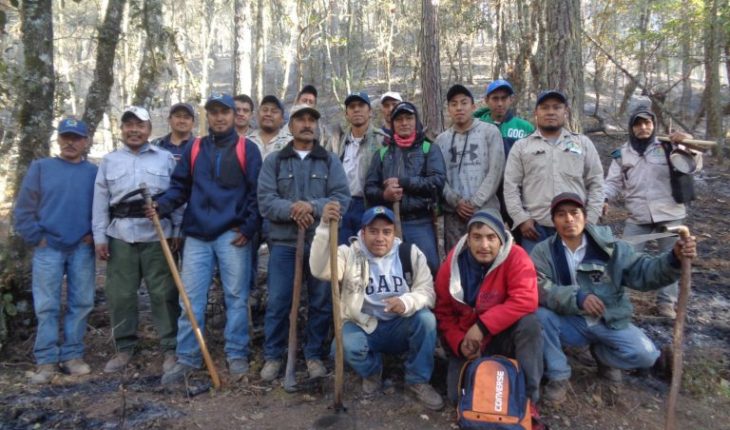For 30 years, the commoners of Ixtlán de Juárez in the Sierra de Oaxaca have been working to sustainably harness the forest resources of the region.
They invest up to 60% of their profits to maintain forest health and meet the needs of schools, seniors, students, as well as to repair roads, install drains, maintain churches, and create jobs.
Currently, they seek the State to recognize, through differential tax treatment, the investments they make in the social sphere, but also in the conservation of forests. This demand is shared by other communities that have created forestry companies in northern, central and southern Mexico.
Read: Forest communities and ecotourism parks suffer from COVID-19 pandemic
According to data from the National Forestry Commission (Conafor), there are 2362 ejidos and communities that carry out forest management in Mexico; but only a little more than half—1392—have managed to form a forestry company.
These are the four keys to understanding why Community forestry companies in Mexico demand differentiated treatment by the State in tax material.
1.Investments in social support and conservation
“You don’t see the forest here as industrialists see it. We have a cosmogonic concept of how the forest provides us with life,” explains José Félix Avitia, engineer and member of the team responsible for the forests of the Tepehuana community of the Sierra Madre Occidental.
This community manages a forest of 144,000 hectares, of which they use 48,000 to extract wood and voluntarily allocate 78,000 hectares to conservation.
In Ixtlán de Juárez, 3500 hectares are intended for the sustainable management and use of wood. There, the same commoners are responsible for eradicating pests, fighting fires and regeneration of the forest. But this vision associated with conservation extends to most of its 19,300 hectares, which is why the wood they produce is internationally certified by the Forest Stewardship Council (FSC).
However, these community forestry companies must work with outdated machinery because their income from the sale of wood is not enough to renew the equipment and, at the same time, cover the social expenses to help the people such as equipping the ambulance, paying the salary of the engineer who carries the forest certification processes or covering the salary of bilingual teachers , among other obligations.
“Community forestry companies take care of the needs that the government does not meet,” says Bernardo Salinas, president of the San Bernardino de Milpillas Chico Community Property Commissioner in Durango, where four small community sawmills have also been installed.
In the study Community Forest Management in Mexico, researchers Ophelia Andrea Valdés and Patricia Negreros point out that forest communities, in addition to generating their own sources of employment, allocate their companies’ profits to improve community living conditions.
2. An equitable fiscal policy
In 1990, the Income Tax Act incorporated a tax exemption for the conservation, marketing, storage and industrialization of ejidos products and agricultural or indigenous communities.
Twelve years later, during Vicente Fox’s rule, that benefit was canceled and, in 2014, tax benefits were restricted to agricultural, livestock, fishing and forestry activities.
Since then, community ecotourism sawmills and companies have had to pay full income tax. A fiscal policy that forced forest communities to engage only in primary activities, which are the least profitable; while industrial processes are in the hands of intermediary companies that, in the case of wood, clean, cut, process and sell it to the end customer without having to invest in communities or forests.
“The law tells us that we can cut fruit, but that we can’t make jam because then they charge us. And no one pays us for all the services we generate that are for everyone, even outside the communities,” explains Oscar Mendez, accountant and commoner of his native Ixtlán.
3.Amendment of the law
Carlos Brown, political economist and independent expert on tax justice, believes that the Mexican state could grant forest communities the tax exemptions they ask for through the figure of tax expenditures.
It is a legal tool,” Brown explains, that is used in different parts of the world and is already applied in northern Mexico to improve competitiveness against the United States.
The end of the companies created by the forest communities is not accumulating wealth but maintaining jobs and improving the living conditions of commoners and ejidatarios, explains biologist Salvador Anta, advisor to the organization Politics and Environmental Legislation (Polea A.C.).
Meps Irma Juan Carlos and Martha Olivia García and Senator Susana Harp have taken on the proposal of the communities and are making amendments to the law.
The proposed legislative initiatives to achieve tax justice for community forestry companies seek to prevent the law from favouring large agricultural, livestock, forestry and fisheries companies.
Ms. Irma Juan Carlos hopes that other legislators will recognize the benefits that forest communities bring, the same “that are not accounted for or visible in the current law”.
Martha Olivia García, also a member of the municipality of Tepehuanes in Durango, points out that community forest management allows to conserve threatened forests. “In Durango there is a lot of cut (deforestation), so we are trying to certify all communities and ejidos, but they are required to be given added value to their products and this generates very high taxes.”
Jaime Sainz, environmental policy researcher at the Center for Economic Research and Teaching (CIDE), says “the best thing to do” is to approve that community forestry companies are exempt from income tax. “International evidence has found that the work of communities is key in the conservation of common environmental goods.”
4. Forests and pandemic
The current Mexican Parliament has until August 2021 to approve the proposed legislative initiatives. However, the economic crisis caused by COVID-19 has put the federal government seeking to increase tax collection in check.
Ernesto Herrera, director of the civil organization Reforestemos Mexico, states that the economic crisis caused by the pandemic has also affected community forestry companies, which had to halt their activities and have fallen in their timber sales of up to 60%.
Faced with this picture, in May 2020, a total of 290 civil society organizations submitted a number of proposals to safeguard Community forestry enterprises, including an extension for the fulfilment of tax obligations.
What we do at Animal Politics requires professional journalists, teamwork, dialogue with readers and something very important: independence. You can help us keep going. Be part of the team.
Subscribe to Animal Politics, receive benefits and support free journalism.#YoSoyAnimal
translated from Spanish: 4 keys to understanding the fight for ‘fiscal justice’
November 22, 2020 |





